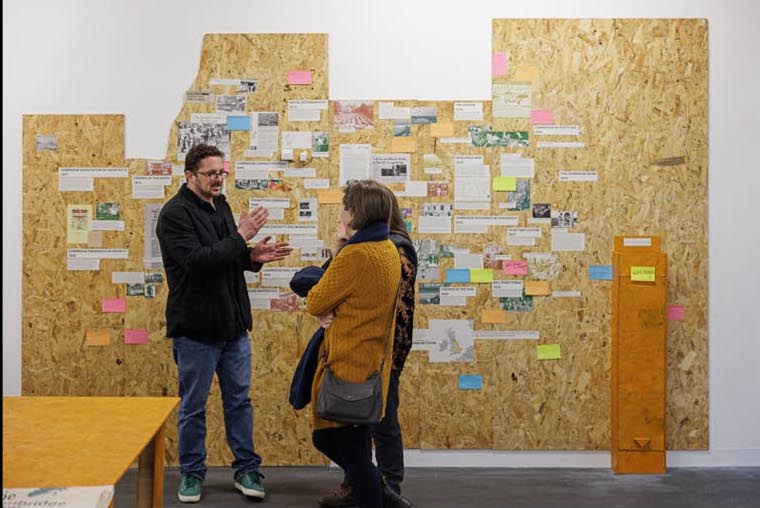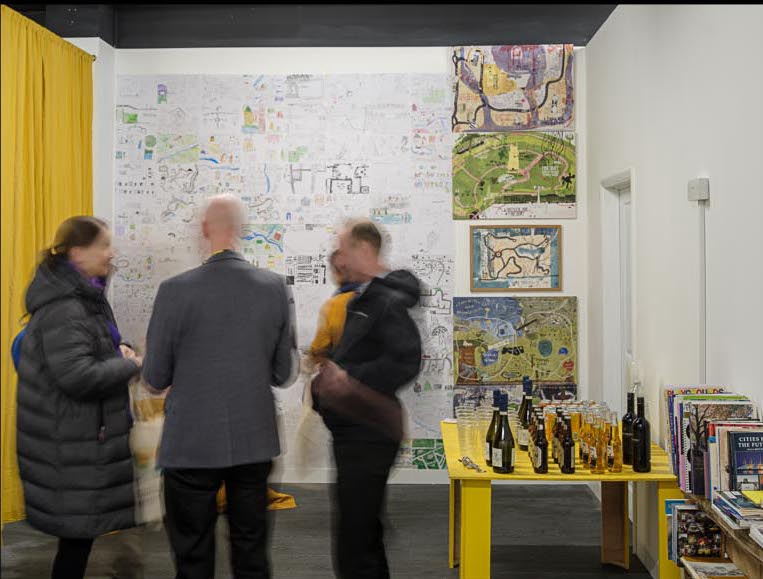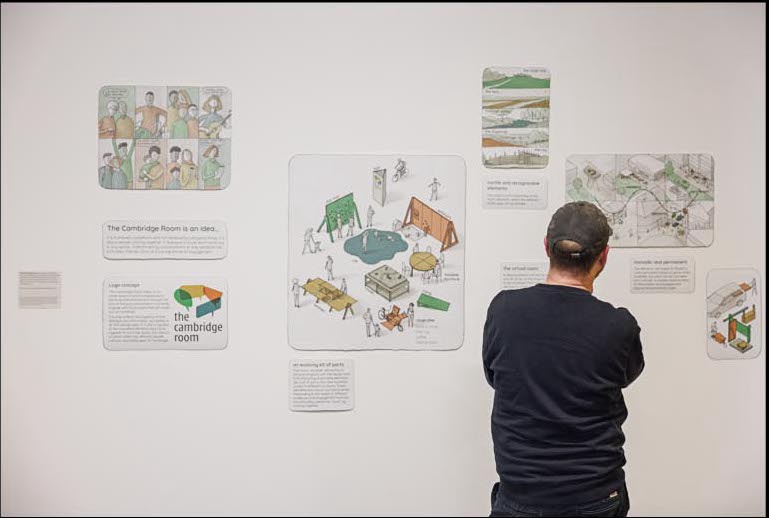Space for inclusive & creative Planning engagement
The Cambridge Room is a unique physical space in Cambridge city with regional pop-ups, enabling inclusive, creative public engagement in Planning.
It connects communities, local authorities, and developers to test ideas, gather evidence, and promote transparency – aiming for communities to advocate for development rather than oppose it.
Background
People engaging with Planning in Cambridge city often face several challenges. For those living and working in the neighbourhood, there are deep concerns about their own and their families’ well-being, including issues related to crime, lack of green space, inequality, disempowerment, and loneliness. Planning is often perceived as boring and inaccessible, and many individuals feel that their voices are not heard in the planning process and want to feel that their opinions and concerns are taken seriously.
Local authorities are concerned about delivering the best services they can in financially constrained times. They are also obligated to their political leaders to deliver services that will win votes and to show that democracy is working but they struggle to achieve meaningful and inclusive levels of engagement. They don’t want to waste time on expensive initiatives that are then rejected by the public like the Congestion Charge. They also need help in resisting developments that have a negative impact on communities creating risk in other areas, for example health. Meanwhile, builders and developers are keen to get their planning proposals through quickly, without risk and without having to employ expensive lawyers. There is also a lack of data available for developers to evidence their own social value credentials and to support their brand awareness.
Overview
The Cambridge Room is a unique physical space in Cambridge city centre, augmented by pop up spaces across the region. We are empowering communities to shape Planning decisions using evidence rooted in local need, now and in the future. Together, we want to reach the point that communities are fighting for development, rather than against it.
For people living and working in the city, it offers the opportunity to engage with the planning system in a serious yet inclusive, fun, creative and educational way, through multiple entry points for participation and connection. For this audience, it will provide a place to:
- Connect people
- Make them feel heard with regards to planning/built environment
- Give them an opportunity to make a difference
- Give them learning opportunities related to planning
- Give them exposure and a platform to engage with planning sector: local authorities/developers/architects
For local authorities, developers and builders, it offers the opportunity to engage with diverse communities, test ideas/concepts, gather evidence, reduce risk, promote transparency and potentially speed up the planning process.
For local authorities, it will:
- Offer a neutral place for the development of rigorous, deep and inclusive conversations about place
- Encourage engagement with Local Authority initiatives such as Local Development Planning
- Provide a place to test out ideas with the public
- Build an evidence base of what works in the city
- Facilitate democracy and the appearance of democracy
For builders and developers, it will:
- Give developers access to a deep and wide network of community members and group
- Reduce risk of complaints about planning proposals and therefore speed up the planning process
- Help developers demonstrate and evidence social value (potentially enhancing their ESG credentials)
- Enhance developer brand awareness
Through its activities The Cambridge Room will build and extensive, diverse and deep network which it can call upon to participate in its engagement activities. The Cambridge Room will also host and develop a series of community made digital maps to assist with the process of community asset mapping.

Opportunity for local authorities and developers
(Quality of Life Toolkit: Key benefit learnings from previous project)
More effective community engagement
Effective community consultation and engagement enable local authorities to build trust, ensure policies reflect community needs, and foster collaboration. It improves decision-making by incorporating diverse perspectives, reduces resistance to projects, and strengthens social cohesion. Engaged communities are more likely to support initiatives, ensuring sustainable, inclusive, and successful local development.
More efficient Local Plan process
Ineffective community engagement often leads to delays, with objections, legal challenges, and disengagement slowing down plan preparation and adoption, testing and adapting.
- Help officers and members engage communities and other interested parties earlier and more meaningfully, reducing resistance later in the process
- Promote inclusive and transparent practices, building trust and fostering a sense of ownership among residents
- Provide tools and strategies for managing contentious issues, reducing the risk of delays caused by public opposition
Alignment with government priorities
- Streamline the planning system to deliver more homes faster
- Strengthen local democracy and ensure that communities have a meaningful voice in shaping their neighbourhoods
- Promote transparency, trust, and accountability in local decision-making
- Encourage adoption of appropriate technology to enhance engagement activity’ or something

Founders
Professor Flora Samuel is a renowned expert on inclusive planning engagement and author of Housing for Health and Wellbeing.
Dr Ruchit Purohit is a development practitioner. researcher, architect, and urban designer. Ruchit has worked on projects ranging from community led regeneration, community led heritage, and community led design in the last 15 years.
References
- https://www.cambridgeroom.org/
- Code of Practice for Community Consultation
- Inclusive engagement toolkit
- Public participation in planning in the UK: A review of the literature
- CQOL national reports (Community Consultation for Quality of Life project 2021 – 2023)
- Public Map Platform
Enquiry for The Cambridge Room
Tags: Cambridge Room, community asset mapping, community collaboration, community consultation, community engagement, community network, creative engagement, developers and builders, evidence-based Planning, inclusive Planning, local authorities, Planning initiatives, Planning process, public engagement, transparency in Planning




